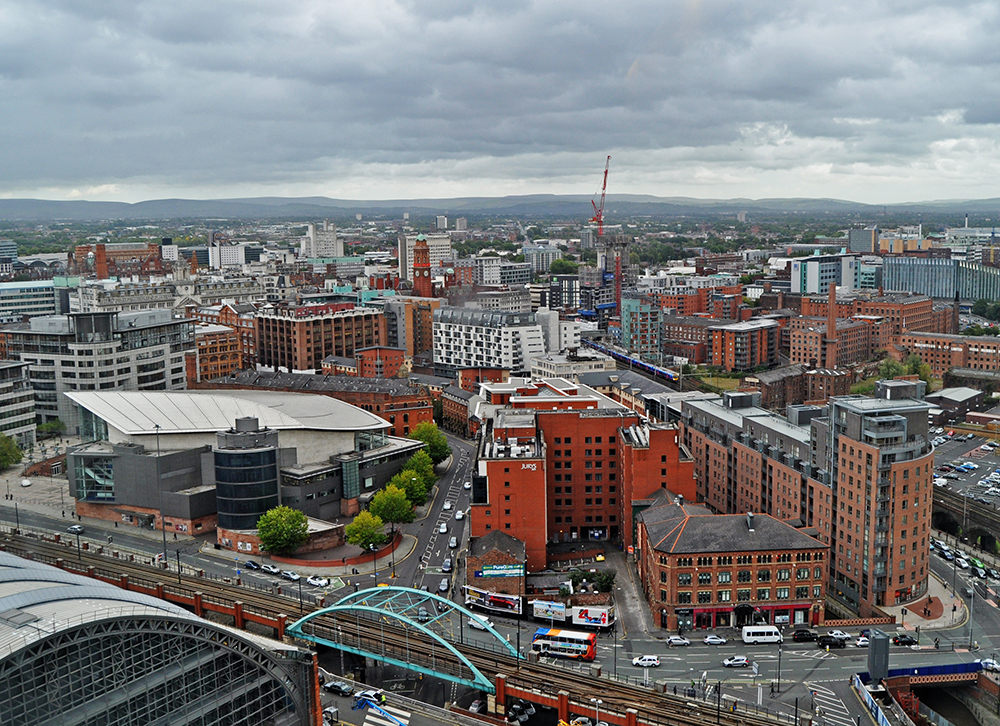
City Minutes
City Minutes: What do the 2021 metro mayoral elections mean for England’s cities?Anthony Breach on the results of England's 2021 metro mayoral elections and what they mean for urban politics.

Senior Analyst Anthony Breach provides in-depth analysis on the results of the 2021 metro mayoral elections, warning that a voting system change to first past the post would be detrimental to the devolution agenda.
With the metro mayor elections earlier this month, much of the media discourse focused on Labour’s difficulties with “Red Wall” voters in the North of England. But not all metro mayor elections are the same, and a realignment in national politics helped Labour win two metro mayor elections in the South of England. Incumbent metro mayors of both parties were re-elected in Northern and Midland cities in part due to their personal popularity and delivery record as mayors. Yet Government proposals to introduce first past the post voting for the metro mayors will weaken them as an institution, by making it harder for strong candidates with great ideas to break through in areas traditionally controlled by the other party.
Centre for Cities has produced a data tool on the 2021 metro mayor elections compared to the previous round, with both the full results by combined authority and the results by local authority presented for the top two candidates. Data for West Yorkshire and London on results by local authority is forthcoming as of the 18th of May 2021.
Before the election, the West Midlands and the Tees Valley mayoralties had been identified by commentators as key elections that would test the strength of the two major national parties. The Conservatives won both elections and managed to improve on their previous results, especially in Tees Valley where Ben Houchen went from winning 51 per cent of the vote in the second round in 2017 to 73 per cent of the vote in the first round in 2021.
Both Conservative metro mayors saw particular gains in what certain commentators have decided to call “Red Wall” areas, with Houchen successfully flipping three local authorities and outperforming the Conservative parliamentary by-election candidate in Hartlepool. This in part reflects a continuation of national and global electoral trends that predated the pandemic and Brexit – areas with higher homeownership, a lower share of graduates, and less wealth trending towards parties on the centre-right over time.
But not all “Red Wall” city-regions went Conservative. The Labour incumbents in Greater Manchester and Liverpool City Region – Andy Burnham and Steve Rotheram – did not just win, but managed to extend their lead over the candidate who came second compared to 2017. West Yorkshire also elected its first Labour metro mayor, Tracy Brabin, with a comfortable 60 per cent of the second-round vote share. Local conditions matter more for local politics than sweeping narratives do.
In part this may be an incumbency effect – but if so it is an incumbency effect that the Mayors have earned. Mayors have been seen to fix problems and deliver on their promises and voters have rewarded mayors from both parties when they have secured local wins and popularised them.
The successful incumbents in the North and Midlands have managed this. Andy Street fought for more investment into the West Midlands’ Metro and Ben Houchen has trumpeted the fulfilment of his 2017 promise to take control of the local airport. Likewise, both Labour incumbents pledged to take control of their cities’ buses and have jointly worked together to strip Northern Rail of its franchise due to poor performance.
This has translated into high, cross-party public support for the metro mayors not just as politicians but as institutions – in a poll commissioned by Centre for Cities earlier this year, 83 per cent of metro mayor voters have said they support further devolution to at least one policy area for this reason.
But incumbency alone was not enough. The Conservatives were defeated in the mayoralties they held in the West of England (WECA) and Cambridgeshire and Peterborough. Part of the reason here is that they have not enjoyed the same policy success or popularity as their re-elected colleagues. The Conservative incumbent mayors in these places – Tim Bowles and James Palmer – had low name recognition locally, which would have made it harder for the party to run on their track record.
These Labour gains in affluent and historically Conservative suburban areas hint at a larger national political realignment in England, one mirroring recent Conservative gains in working class and historically Labour places. Yet while the latter has already had a big political impact, the former is just starting to change English politics.
While Labour made a small gain in Bristol, its share of the second-round vote shot up in Bath and North East Somerset from 39 per cent in 2017 to 56 per cent in 2017. Likewise, in Cambridgeshire and Peterborough, Labour made so many gains it was able to overtake the Liberal Democrats and make it into the second round and ultimately win the mayoralty – but these gains for Labour were made in Peterborough and the affluent rural authorities, while Labour barely improved on the Liberal Democrat performance in Cambridge and the surrounding South Cambridgeshire.
We can also see both sides of this realignment under the surface of the metro mayors who were re-elected in the supposed “Red Wall”. Andy Burnham’s leads in Wigan and Oldham actually narrowed compared to 2017, but were more than compensated for by bigger gains in both central Manchester and especially the historically weak suburban territory for Labour in Trafford and Stockport. Likewise, although Andy Street managed to flip Wolverhampton with a 7 per cent gain and advance within Birmingham, he also saw a small but noticeable reversal in the Tory stronghold of Solihull, losing 3 per cent of the second round’s vote share.
This national realignment means more places are up for grabs – if mayors are able to earn it. Strong local candidates such as Andy Street and Ben Houchen are able to punch above their party’s weight, even when the party is performing well nationally, because the metro mayoralties as institutions give them the opportunity to deliver. This matters especially as both parties’ heartlands become more competitive due to national trends which the parties cannot avoid.
The Home Office’s proposal to replace the current supplementary vote system, which has a second round for the top two candidates if no candidate reaches 50 per cent of the vote, with first past the post will though weaken this. The effect will be to strengthen local parties in places where they are already strong, and make breakthroughs with strong candidates more difficult as safe mayors become safer. Local elections will more closely reflect voters’ beliefs about national rather than local politics.
This would be a step backwards for the devolution agenda. It would hamper MHCLG’s efforts to build up the responsibility and capacity of local government for taking tough decisions, as it will reduce the electoral incentive for candidates to win on good ideas and a promise to deliver rather than party identity. Introducing first past the post at the metro mayor level would also entrench party fiefdoms rather than problem solving within local government, and do little to slow or stop the changes in voter behaviour and identity taking place at the national level.
Voters want the metro mayors to take more tough decisions and more responsibility for fixing local problems. The Government should scrap the plans to abolish the supplementary vote if they want this too.

Anthony Breach on the results of England's 2021 metro mayoral elections and what they mean for urban politics.

Reflecting on the results of the elections to the devolved parliaments in Scotland and Wales, Anthony Breach proposes that politicians should take inspiration from the popularity and success of the English metro mayors and embark on a wave of urban devolution.

Explore the results of the mayoral elections in Greater London, Greater Manchester, West Midlands, Liverpool City Region, Tees Valley, Cambridgeshire and Peterborough, West of England and West Yorkshire.

Find out everything there is to know about the 2024 metro mayoral elections through polling data, podcast discussions and post-election analysis from Centre for Cities.
Leave a comment
Jim FORD
These results suggest that the Metro Mayoral devolution agenda is popular with the electorate and should be complimented by directly electing assemblies as in London and the devolved nations to enable the mayoralities to have greater devolved budgets, for which the local power of scrutiny would be important.
James Stevens
Very helpful analysis of the voting patterns of the people by local authority in the metro mayoral elections. Many thanks.